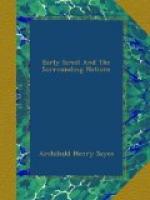But besides this immediate cause there was yet another. They were assured of a welcome in the kingdom of the Nile and the gift of a district in which they might live. One of the sons of Jacob had become the Vizier of the Egyptian Pharaoh. Joseph, the Hebrew slave who had been sold into bondage by his brothers, had risen to be the first minister of the king and the favourite of his sovereign. He had foretold the coming years of plenty and dearth; but he had done more—he had pointed out how to anticipate the famine and make it subserve the interests of despotism. He was not a seer only, he was a skilful administrator as well. He had taken advantage of the years of scarcity to effect a revolution in the social and political constitution of Egypt. The people had been obliged to sell their lands and even themselves to the king for bread, and become from henceforth a population of royal slaves. The lands of Egypt were divided between the king and the priests; the peasantry tilled them for the state and for the temples, while the upper classes owed their wealth and position to the offices which they received at court.
It would seem that the Israelites entered Egypt when the country was governed by the last of those foreign dynasties from Asia which had conquered the kingdom of the Pharaoh, and are known by the name of the Hyksos or Shepherd kings. The Egyptian monuments have shown us that during their dominion its internal constitution underwent precisely the change which is described in the history of Joseph. Before the Hyksos conquest there was a great feudal aristocracy, rich in landed estates and influence, which served as a check upon the monarch, and at times even refused to obey his authority. When the Hyksos conquerors are finally expelled, we find that this feudal aristocracy has disappeared, and its place has been taken by a civil and military bureaucracy. The king has become a supreme autocrat, by the side of whom the priests alone retain any power. The land has passed out of the hands of the people; high and low alike are dependent for what they have on the favour of the king.
The Hyksos dynasties were allied in race and sympathies with the settlers from Asia. Joseph must have died before their expulsion, but it is probable that he saw the outbreak of the war which ended in it, and which after five generations of conflict restored the Egyptians to independence. The Eighteenth dynasty was founded by the native princes of Thebes, and the war against the Asiatic stranger which had begun in Egypt was carried into Asia itself. Canaan was made an Egyptian province, and the Egyptian empire was extended to the banks of the Euphrates.




